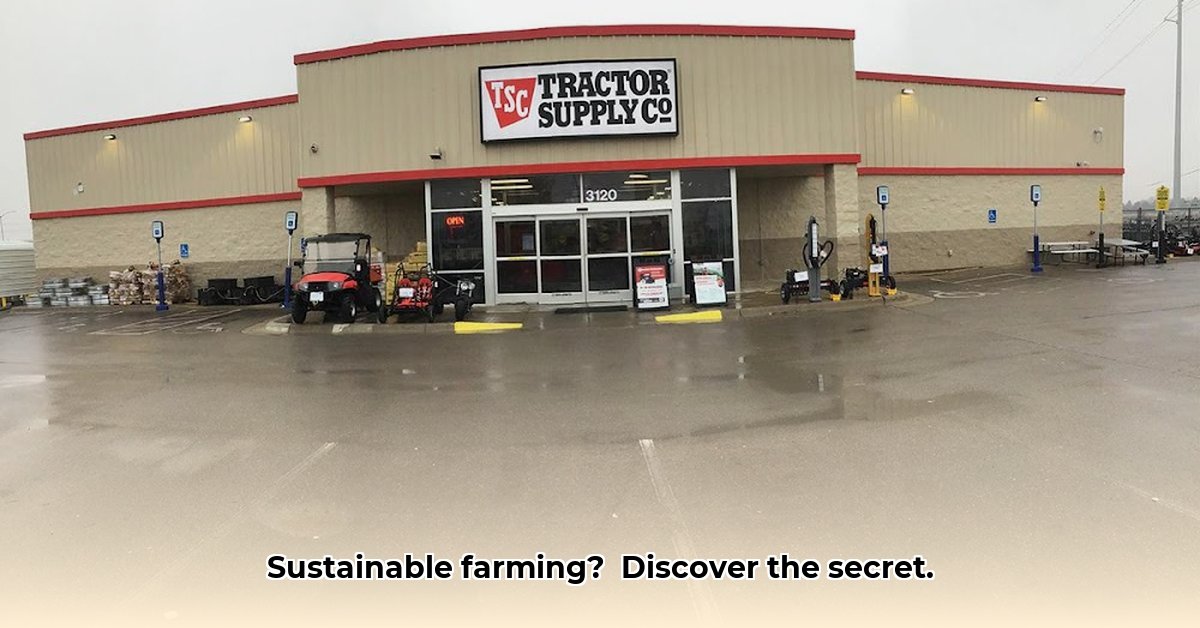
Saline Tractor Supply (STS) offers more than just farm supplies; it presents a significant opportunity to support sustainable agriculture in the Saline, Michigan area. While not explicitly focused on sustainability, its product range and accessibility make it a valuable resource for environmentally conscious farmers and gardeners. This article explores how STS can contribute to a greener future and offers actionable steps for stakeholders to maximize its potential. For the latest deals, check out the weekly ad.
A Closer Look at Sustainable Supplies at Saline Tractor Supply
STS's inventory surprisingly caters to sustainable practices. Beyond tractors and traditional farm equipment, expect to find essential items for eco-friendly farming and gardening.
Livestock Feed and Care
STS likely stocks a variety of livestock feed, potentially including organic options. Consider checking for feed sources that prioritize locally sourced ingredients and sustainable farming methods. Beyond feed, you might find naturally derived pest control solutions for livestock.
Gardening Supplies
For the home gardener, STS offers an array of organic seeds, compost, and soil amendments. These are crucial for building healthy soil, enhancing crop yields, and reducing the need for chemical fertilizers. Look for products labeled as organic or those indicating sustainable sourcing. The availability of tools facilitating water conservation, such as drip irrigation systems, also enhances sustainable gardening practices.
Farm Equipment and Tools
While not always explicitly marketed as "sustainable," many of the tools and equipment at STS can support sustainable farming. Tools for efficient water management, such as drip irrigation systems, and equipment for soil conservation contribute to environmentally sound practices.
Accessibility and Community Impact
STS's convenient location in Saline makes sustainable supplies more accessible to a wide range of stakeholders. Serving a large area including Whittaker, Milan, Bridgewater, Ypsilanti, Willis, Clinton, and Ann Arbor, it reduces travel time and fuel consumption for farmers and gardeners seeking environmentally friendly products. This accessibility itself promotes sustainable practices by reducing the environmental footprint associated with sourcing supplies.
Areas for Improvement: Strengthening STS's Sustainability Commitment
While STS offers a good foundation, several improvements could significantly enhance its contribution to sustainable agriculture.
- Clearer Labeling: Implementing clearer labeling of sustainable products (organic certifications, eco-friendly manufacturing) would significantly aid consumer decision-making.
- Staff Training: Educating staff on sustainable agricultural practices empowers them to advise customers effectively on eco-friendly methods such as integrated pest management (IPM) and soil health management.
- Community Partnerships: Collaborating with local sustainable agriculture organizations could enhance sourcing of sustainable products, expand outreach programs, and promote best practices. Increased transparency regarding supply chains would further build trust and enhance credibility.
Actionable Steps for a Greener Future
1. For Local Farmers:
a. Prioritize Organic and Sustainable Options: Actively seek out organic seeds, fertilizers, and pest control options at STS. b. Engage with Staff: Interact with staff to seek advice on implementing sustainable practices on your farm. c. Advocate for Change: Provide feedback to STS management suggesting improvements to their selection of sustainable supplies.
2. For Backyard Gardeners:
a. Opt for Organic Gardening Supplies: Choose organic seeds, compost, and other eco-friendly gardening products from STS. b. Utilize Water-Efficient Practices: Implement water-efficient irrigation techniques using supplies from STS (e.g., drip irrigation). c. Learn from Staff: Ask STS staff for advice on sustainable gardening techniques like natural pest control.
3. For Community Organizations:
a. Partner with STS: Collaborate on community garden projects, workshops, and educational initiatives. b. Promote Sustainable Practices: Encourage STS to implement clear sustainability metrics and improve product labeling. c. Advocate for Increased Sustainability: Support and promote STS’s efforts toward better sustainable practices.
4. For Saline Tractor Supply Management:
a. Invest in Staff Education: Provide comprehensive training on sustainable agriculture practices to the staff. b. Create a Dedicated Sustainability Section: Develop a clearly defined section in-store and online showcasing sustainable products. c. Partner with Local Organizations: Establish collaborations with local sustainable agriculture groups for shared initiatives and sourcing.
Conclusion: Cultivating a Sustainable Future Together
Saline Tractor Supply has the potential to play a vital role in supporting sustainable agriculture in the local community. By implementing the suggested improvements and fostering collaboration, STS can considerably amplify its positive impact and become a model for other farm supply stores seeking to embrace environmental sustainability. The future of sustainable farming in Saline hinges on collective action, and STS has a critical role to play in this growth.